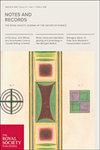Pesticides, pollution and the UK's silent spring, 1963–1964: Poison in the Garden of England
IF 0.6
3区 哲学
Q3 HISTORY & PHILOSOPHY OF SCIENCE
Notes and Records-The Royal Society Journal of the History of Science
Pub Date : 2017-09-20
DOI:10.1098/rsnr.2016.0040
引用次数: 10
Abstract
Despite being characterized as ‘one of the worst agricultural accidents in Britain in the 1960s’, the ‘Smarden incident’ has never been subjected to a complete historical analysis. In 1963, a toxic waste spill in Kent coincided with the publication of the British edition of Rachel Carson's Silent spring. This essay argues that these events combined to ‘galvanize’ nascent toxic and environmental consciousness. A seemingly parochial toxic waste incident became part of a national phenomenon. The Smarden incident was considered to be indicative of the toxic hazards that were born of technocracy. It highlighted the inadequacies of existent concepts and practices for dealing with such hazards. As such, it was part of the fracturing of the consensus of progress: it made disagreements in expertise publicly visible. By the completion of the episode, 10 different governmental ministries were involved. Douglas Good, a local veterinary surgeon, helped to effect the ‘reception’ of Silent spring in the UK by telling the ‘Smarden story’ through local and national media and through the publications of anti-statist organizations.农药、污染和英国寂静的春天,1963-1964:英格兰花园里的毒药
尽管被描述为“20世纪60年代英国最严重的农业事故之一”,但“斯马尔登事件”从未进行过完整的历史分析。1963年,肯特郡的一次有毒废物泄漏恰逢英国版Rachel Carson的《寂静的春天》出版。这篇文章认为,这些事件结合在一起“激发”了新生的有毒和环境意识。一个看似狭隘的有毒废物事件成为全国现象的一部分。斯马尔登事件被认为表明了技术官僚所产生的有毒危害。它强调了处理这种危险的现有概念和做法的不足之处。因此,这是打破进步共识的一部分:它使专业知识方面的分歧公开可见。该集结束时,有10个不同的政府部门参与其中。当地兽医道格拉斯·古德(Douglas Good)通过当地和国家媒体以及反中央集权组织的出版物讲述了“斯马尔登的故事”,帮助英国“接待”了寂静之春。
本文章由计算机程序翻译,如有差异,请以英文原文为准。
求助全文
约1分钟内获得全文
求助全文
来源期刊
CiteScore
1.50
自引率
0.00%
发文量
45
审稿时长
>12 weeks
期刊介绍:
Notes and Records is an international journal which publishes original research in the history of science, technology and medicine.
In addition to publishing peer-reviewed research articles in all areas of the history of science, technology and medicine, Notes and Records welcomes other forms of contribution including: research notes elucidating recent archival discoveries (in the collections of the Royal Society and elsewhere); news of research projects and online and other resources of interest to historians; essay reviews, on material relating primarily to the history of the Royal Society; and recollections or autobiographical accounts written by Fellows and others recording important moments in science from the recent past.

 求助内容:
求助内容: 应助结果提醒方式:
应助结果提醒方式:


